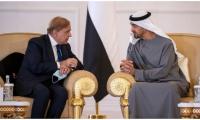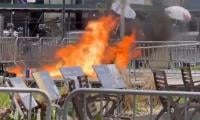The battle with C-ovid19 which has claimed over 60 lives in Pakistan and thousands more around the world has taught us many things about ourselves.
In many ways, we have acted as a nation that does indeed recognize responsibility and is able to exercise discipline. The cooperation of people with government orders to stay off the streets, to social distance and to protect others by placing themselves in quarantine has been in many ways better than expected.
There are circles marked out at banks so people can queue at an appropriate distance from each other, most seen on the streets of Lahore are wearing masks of one kind or the other and, though there has been a degree of panic-buying, notably among the elite whose focus is primarily on protecting themselves while ignoring others, this has not been as drastic as the kind of plunder of supermarkets seen in other countries around the globe, including developed western nations which have run out of toilet paper and all kinds of other necessities.
As we already know, Pakistan’s philanthropic commitments have always been high and we rank as at least the third most generous nation in the world in terms of giving to others. While the government effort to distribute rations, despite the prime minister’s promises, have still to get off the ground, groups such as the always dependable Edhi Foundation, the Al-Khidmat welfare wing of the Jamaat-e-Islami and the Karachi-based Alamgir Welfare Trust have been doing an excellent job as far as distributing food to those in most need and sanitizing premises including mosques, churches and temples has been superb.
The Sindh government has played the biggest role in supporting these efforts and helping to organize them so that chaos can be avoided. On the other hand, we have people who have taken it upon themselves to distribute sacks of flour or other items from their luxury cars, in some cases take selfies with the random people they give out the supplies too, in other cases embarrass those who do not wish to be photographed while accepting rations and then posting this content over social media.
But most of all, Covid-19 has brought about not only in our own country but all over the world a change in the relationship between capitalist states and the people who live within them. Suddenly, the state has had to play a much bigger role in the lives of people, determining where they go, what they do and how they behave. It has also had to step in to support those rendered jobless in a matter of moments and find ways to provide them with essentials. The collapse of the economic system supported by corporate entities and institutions has raised questions about the very nature of capitalism.
We can see this in many places. In the US, hospitals are clearly unable to cater to the needs of the thousands who require medical aid. Tens of thousands of people in the world’s richest country cannot afford medical care, because they have no health cover. Those who have lost jobs have also lost health insurance, and unlike welfare-oriented states including Sweden and other European countries, there is nothing for them to fall back on. The US has also been unable to protect its doctors, and most lately has essentially hijacked a shipment of protective equipment being sent to Germany and Canada by China, keeping it for its own medics.
Naturally, the countries who had sought these goods have protested. Nurses in the US’s largest cities have been attempting to protect themselves with garbage bags and doctors are engaged in an effort to find a way to use one ventilator for two patients. There are simply not enough to cater to all. Doctors must choose then who is to live and who is to die. This is the outcome of the manner in which capitalism operates. Other countries including Cuba which have invested heavily in healthcare have fared far better, showing the ability to care not only for their own people but also send out teams in other countries. Somewhere in this there is a message.
The message has also reached us. Our virtually non-existent healthcare structure, supported by under two percent of the GDP allocated to it is already struggling to cope with the rising number of Covid cases. The fear that these cases will increase dramatically as more tests are conducted raises further questions about why we have not invested in health through the seven decades of our existence.
The same questions had been asked following the 2005 earthquake which devastated Azad Kashmir and parts of what is now Khyber Pakhtunkhwa. In Quetta, hospitals have failed to even manage breakfast for the patients coming in – but this is hardly surprising given that even in normal circumstances, in our largest cities, two or even three patients are squeezed onto one bed and medical care at public sector hospitals is far below any standard set by international bodies.
We have also failed to provide our doctors with protective equipment, and arrested those in Quetta who protested the lack of visors, masks and gloves to save them from infection. Already two doctors are dead and many others infected. It is not clear if anyone is bothered to even test the nurses and lower level medical staff on duty in hospital wards.
Despite these circumstances, people have bravely soldiered on. Where the government has failed, they have attempted to take over on their own. Young people in Lahore have been distributing food packets donated by restaurants and even small businesses, well before the PM’s Corona Tiger Force can move into action. This force, an obvious and clumsy political stunt, would not have been necessary had the grassroots structure of local governments been kept intact. The absence of local governments in Punjab, KP and Balochistan is being felt everywhere, with opposition parties demanding that in provinces where there term has ended, previously elected structures be restored and in Punjab some way found to get past the problem of elections which have been delayed repeatedly, perhaps because the ruling party fears failure at this basic level of governance.
Education too is in disarray because the Higher Education Commission has chosen to ignore the fact that not all university students have access to internet or even to laptops or other equipment. Despite this, students everywhere have tried to continue their lessons, using mobile phones to access classrooms. The situation has resulted in people thinking far harder than before about the role of the state in their lives and their relationship with it. What will emerge in the future from this thinking will be important not only for our country but also for nations around the world.
The writer is a freelancecolumnist and formernewspaper editor.
Email: kamilahyat@hotmail.com







